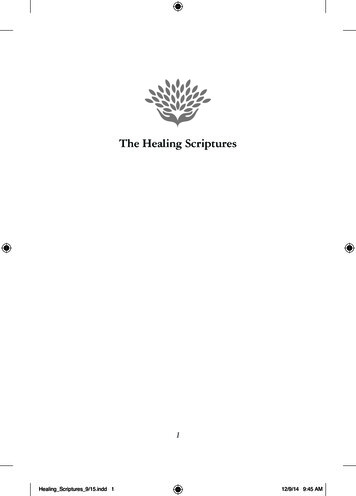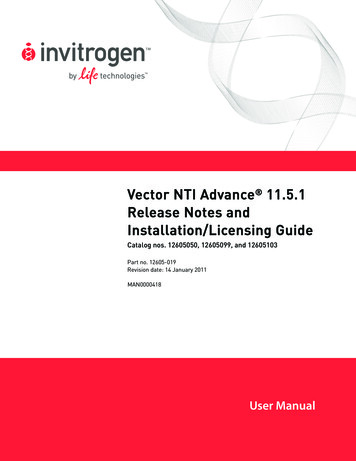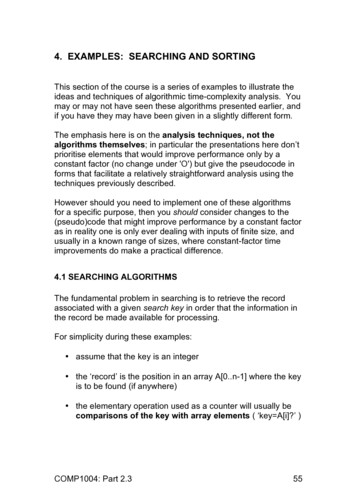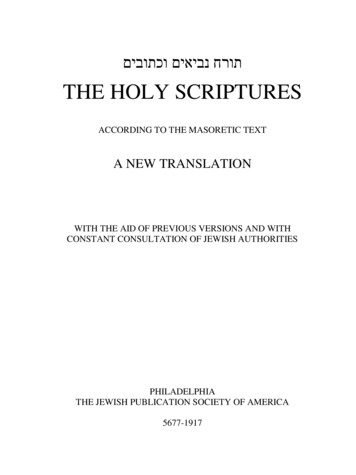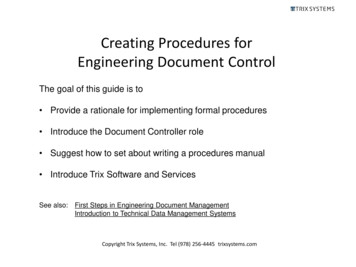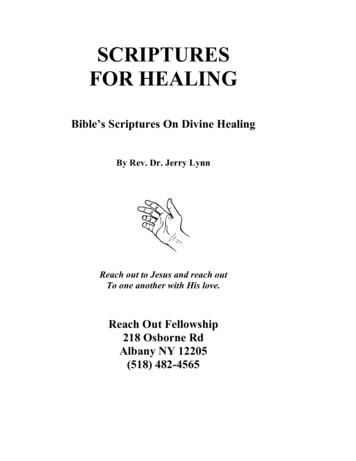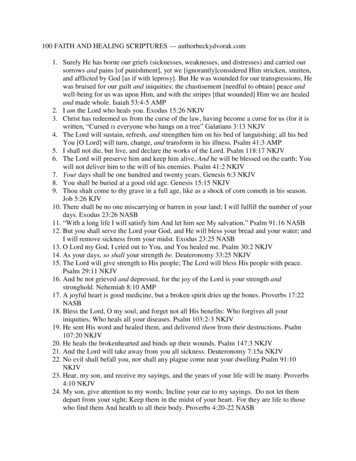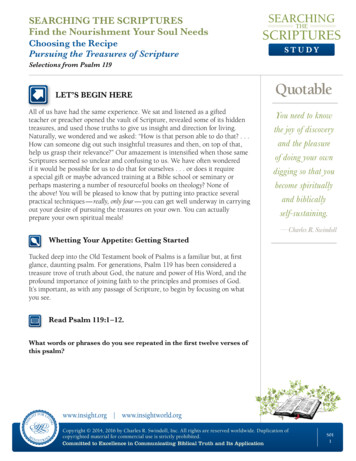
Transcription
SEARCHING THE SCRIPTURESFind the Nourishment Your Soul NeedsChoosing the RecipePursuing the Treasures of ScriptureST U DYSelections from Psalm 119LET’S BEGIN HEREAll of us have had the same experience. We sat and listened as a giftedteacher or preacher opened the vault of Scripture, revealed some of its hiddentreasures, and used those truths to give us insight and direction for living.Naturally, we wondered and we asked: “How is that person able to do that? . . .How can someone dig out such insightful treasures and then, on top of that,help us grasp their relevance?” Our amazement is intensified when those sameScriptures seemed so unclear and confusing to us. We have often wonderedif it would be possible for us to do that for ourselves . . . or does it requirea special gift or maybe advanced training at a Bible school or seminary orperhaps mastering a number of resourceful books on theology? None ofthe above! You will be pleased to know that by putting into practice severalpractical techniques — really, only four — you can get well underway in carryingout your desire of pursuing the treasures on your own. You can actuallyprepare your own spiritual meals!QuotableYou need to knowthe joy of discoveryand the pleasureof doing your owndigging so that youbecome spirituallyand biblicallyself-sustaining.— Charles R. SwindollWhetting Your Appetite: Getting StartedTucked deep into the Old Testament book of Psalms is a familiar but, at firstglance, daunting psalm. For generations, Psalm 119 has been considered atreasure trove of truth about God, the nature and power of His Word, and theprofound importance of joining faith to the principles and promises of God.It’s important, as with any passage of Scripture, to begin by focusing on whatyou see.Read Psalm 119:1 – 12.What words or phrases do you see repeated in the first twelve verses ofthis psalm?www.insight.org www.insightworld.orgCopyright 2014, 2016 by Charles R. Swindoll, Inc. All rights are reserved worldwide. Duplication ofcopyrighted material for commercial use is strictly prohibited.Committed to Excellence in Communicating Biblical Truth and Its ApplicationS011
Choosing the RecipePursuing the Treasures of ScriptureSelections from Psalm 119ST U DYBased on what you observe, what or who is the main focus of this psalm?How many times does the psalmist make reference to the Lord? Write down a few examples.The psalmist also emphasized the importance of the Word.In these opening verses of Psalm 119, describe how the psalmist viewed the Word of God.Write down the words the psalmist used to describe the Scriptures.Using a Bible concordance (for a definition of this valuable Bible study resource, see “SomeHelpful Tools” below) and look up the word law. Write down three or four references where thatword is used. Look up those verses, and make some notes on the different ways law is used.www.insight.org www.insightworld.orgCopyright 2014, 2016 by Charles R. Swindoll, Inc. All rights are reserved worldwide. Duplication ofcopyrighted material for commercial use is strictly prohibited.Committed to Excellence in Communicating Biblical Truth and Its ApplicationS012
Choosing the RecipePursuing the Treasures of ScriptureSelections from Psalm 119ST U DYWhat emotions do you notice are expressed in these verses?What emotions do you feel when thinking of the value of God’s Word?By observing the multiple use of the pronouns You and Your in reference to the Lord, we can determine that thispsalm is primarily a prayer about the wonder and glory of His Law.A CLOSER LOOKPsalms Become the Language of the HeartThe book of Psalms in the Old Testament swells with examples of deep humanemotion — from the triumphant declaration of godliness in Psalm 1, to the stridentquestions of a doubting king in Psalm 13, to the fortress-like confidence which flowsfrom Psalm 46. Each reflects a real-time human experience and the language of abeliever going with God in prayer. Image and metaphor become the language ofappeal for the faithful — and in the psalms, we find a prayer language of our own aswe wrestle with how to talk to God.By becoming students of the Psalms, we can learn to pray and deepen our experiencewith the Lord. For instance, David cried out to the Lord in Psalm 42: “I hear thetumult of the raging seas / as your waves and surging tides sweep over me”(Psalm 42:7).This is the language of a prayer of desperation — the words of one feeling as if life,like a mounting wave, threatens to overtake him.Psalm 37 contrasts the fate of the wicked with the favor of those who put their trustin God. David, Israel’s shepherd king, called on the Lord in prayer, rehearsing thepromises of His goodness for “the one who delights in him” (37:23 NIV).Continued on next pagewww.insight.org www.insightworld.orgCopyright 2014, 2016 by Charles R. Swindoll, Inc. All rights are reserved worldwide. Duplication ofcopyrighted material for commercial use is strictly prohibited.Committed to Excellence in Communicating Biblical Truth and Its ApplicationS013
Choosing the RecipePursuing the Treasures of ScriptureSelections from Psalm 119ST U DYContinued from previous pageAny believer struggling to find words to express the deepest loss or the highest praiseneeds only turn to the Psalms to find his or her voice and a holy script to bring toGod in prayer.Heart Essentials (Psalm 119:1 – 2, 11 – 12)By observing the following key elements in the opening verses of Psalm 119, we discover certain conditionsof the heart, or attitudes, essential for studying the Scriptures. Personal integrity and purityJoyful are people of integrity,who follow the instructions of the Lord. (Psalm 119:1) A willingness to follow His commandsJoyful are those who obey his lawsand search for him with all their hearts. (119:2) A commitment of time for prayer and meditationI have hidden your word in my heart,that I might not sin against you.I praise you, O Lord;teach me your decrees. (119:11 – 12)Some Helpful ToolsJust as an archaeologist would never search for buried artifacts without the proper tools, we should neversearch the Scriptures without these helpful tools for study. A Bible. Make certain you have your own copy of the Scriptures in a translation you can understand. A Bible dictionary. This resource defines and provides in-depth information about key words andcharacters in the Bible. A concordance of the Bible. This is virtually an alphabetical listing of every major word in the Bible. A set of Bible maps. Most study Bibles today include a very reliable set of maps, typically as part ofthe end matter. You can also purchase a Bible atlas, which not only includes an extensive selection ofmaps but scholarly contextual information too. Students can also consult important tools online or use very helpful Bible-study software found atwww.logos.com, www.biblegateway.com, www.soniclight.com, and many others.www.insight.org www.insightworld.orgCopyright 2014, 2016 by Charles R. Swindoll, Inc. All rights are reserved worldwide. Duplication ofcopyrighted material for commercial use is strictly prohibited.Committed to Excellence in Communicating Biblical Truth and Its ApplicationS014
Choosing the RecipePursuing the Treasures of ScriptureSelections from Psalm 119ST U DYPersonal PromisesAs you do the hard work of digging deep into the Scriptures, personal promises will emerge from yourstudy. By the way, when you are searching the Scriptures, be on the lookout for promises God offers to you.So many passages in the Bible are full of these truths. Psalm 119 is no exception. You can gain . . . The promise of spiritual wisdom (Psalm 119:97 – 98) The promise of spiritual insight (119:99) The promise of spiritual understanding (119:33 – 40)Ways We Absorb God’s TruthFrom our study of Psalm 119, we find five specific ways we absorb God’s truth:1. We absorb God’s truth by hearing it (Romans 10:19).2. We absorb God’s truth by reading it (Psalm 119:18).3. We absorb God’s truth by studying it (2 Timothy 2:15).4. We absorb God’s truth by memorizing it (Psalm 119:13).5. We absorb God’s truth by meditating on it (Psalm 119:23).Techniques That Reveal the TreasureNow you’re ready to dig into the truths of Scripture on your own. To begin to discover the riches of God’sWord, you can use four simple techniques to help you in your study.1. Observation — What do I see?2. Interpretation — What does it mean?3. Correlation — How does it relate?4. Application — What difference does it make?YOUR TURN IN THE KITCHENThe Searching the Scriptures series is designed to help you not only gain a deeper and more substantiveunderstanding of God’s Word but perhaps more importantly to teach you how to dig deep into theScriptures for yourself. Over time, you will develop a skill and a style that will serve you for a lifetime.Continued on next pagewww.insight.org www.insightworld.orgCopyright 2014, 2016 by Charles R. Swindoll, Inc. All rights are reserved worldwide. Duplication ofcopyrighted material for commercial use is strictly prohibited.Committed to Excellence in Communicating Biblical Truth and Its ApplicationS015
Choosing the RecipePursuing the Treasures of ScriptureSelections from Psalm 119ST U DYContinued from previous page.Not unlike a skilled chef surveys the shelves of the kitchen for all the necessary and perfect ingredients for adelightful and nourishing meal, you can begin a process of learning to prepare spiritual meals for yourself.Ultimately, the goal will be for you to offer these truths to others in ways that are both palatable andenriching spiritually.So before going any further, you need to put on your apron and ready yourself to try your hand at preparinga wonderful meal of biblical nourishment and encouragement. Are you ready to try your turn? Below are sixpractical exercises to get you started.1. Take time to carefully read Psalm 119:1 – 40. Make a list of everything this psalm says about God’sWord. (Remember that God’s Word can also be referred to as commandments, laws, instructions,decrees, and regulations.) For example, “People who obey God’s Word are joyful” (verse 1), and “Godhas charged us to obey His commandments” (verse 4).2. What kind of wisdom can a person get from studying God’s Word? Use Psalm 119:97 – 105 as yourguide.3. In any substantive Bible concordance, you will find multiple Bible verses that include the word integrity.If you have a concordance, find this word in your volume and scan the references it includes. Also, lookup each of the following references in your Bible and note God’s calling for believers in each one: Deuteronomy 9:52 Samuel 22:261 Kings 9:42 Chronicles 19:7Psalm 119:1Proverbs 2:7, 21Proverbs 10:9, 291 Timothy 3:8www.insight.org www.insightworld.orgCopyright 2014, 2016 by Charles R. Swindoll, Inc. All rights are reserved worldwide. Duplication ofcopyrighted material for commercial use is strictly prohibited.Committed to Excellence in Communicating Biblical Truth and Its ApplicationS016
Choosing the RecipePursuing the Treasures of ScriptureSelections from Psalm 119ST U DYWhat do these verses teach you about the biblical call to a life of integrity?4. As we learned in this message, it’s helpful to look up words in the dictionary, especially in a Bibledictionary, to learn their meanings. Note the key word sacrifice in the following verse:This is real love — not that we loved God, but that he lovedus and sent his Son as a sacrifice to take away our sins.(1 John 4:10, emphasis added)Turn to this verse in your own Bible and notice the word that is used. Some translations use “atonement”while others say “propitiation.” Look up the word used in your Bible in a Bible dictionary.How is it defined?Once you understand the meaning of this important word that illustrates what Jesus accomplished on thecross, describe sacrifice (or whatever word is used in your Bible) in your own words, using these passages toassist you.Romans 3:25Hebrews 2:17www.insight.org www.insightworld.orgCopyright 2014, 2016 by Charles R. Swindoll, Inc. All rights are reserved worldwide. Duplication ofcopyrighted material for commercial use is strictly prohibited.Committed to Excellence in Communicating Biblical Truth and Its ApplicationS017
Choosing the RecipePursuing the Treasures of ScriptureSelections from Psalm 119ST U DY1 John 2:25. A map can help you understand the context for the stories and events that take place in the Scriptures.Turn to the maps in the back of your Bible or to online maps. Locate one that traces the second journeyof Paul. Follow that long journey with your finger, and as you do, take note of the places he traveled.You’ll see that when he arrived at Troas in the western part of Asia Minor (the country known as Turkeytoday), he had to sail across the Aegean Sea to reach Europe. Once there, he went to Philippi and thenon to Greece, where he continued to preach the gospel. Again, trace the remainder of his lengthy secondjourney with your finger. Pause and imagine how rugged his journey must have been as he traveled thatdistance in the first century.6. Read and study Psalm 19:7 – 11. What promises are given to the believer who studies God’s Word? (Listat least five descriptions of God’s Word from these verses.)A FINAL PRAYERFather, deepen my love for Your Word and give to me a greater desire to search the Scriptures on my own.Thank You for revealing Yourself in the pages of Your Word and in the person of Your Son, Jesus Christ. Amen.www.insight.org www.insightworld.orgCopyright 2014, 2016 by Charles R. Swindoll, Inc. All rights are reserved worldwide. Duplication ofcopyrighted material for commercial use is strictly prohibited.Committed to Excellence in Communicating Biblical Truth and Its ApplicationS018
Choosing the RecipePursuing the Treasures of ScriptureSelections from Psalm 119ST U DYMore from the CupboardSearching the Scriptures:Find the NourishmentYour Soul Needs—A Classic Seriesby Charles R. SwindollCD seriesSearching the Scriptures:Find the NourishmentYour Soul Needsby Charles R. Swindollsoftcover bookGod’s Word for You:An Invitation to Findthe Nourishment YourSoul Needsby Charles R. SwindollLeatherLike bookFor these and related resources, visit www.insightworld.org/storeor call USA 1-800-772-8888 AUSTRALIA 61 3 9762 6613 CANADA 1-800-663-7639 UK 44 1306 640156When the book Searching the Scriptures: Find the Nourishment Your Soul Needs was written, the format for this STS studywas developed by Charles R. Swindoll and Rhome van Dyck and published at the end of chapter three under the title“Your Turn in the Kitchen.” For the 2016 broadcast, this STS study was expanded with additional material by Mark Tobeyin collaboration with Charles R. Swindoll based upon the original outlines, charts, and sermon transcripts.www.insight.org www.insightworld.orgCopyright 2014, 2016 by Charles R. Swindoll, Inc. All rights are reserved worldwide. Duplication ofcopyrighted material for commercial use is strictly prohibited.Committed to Excellence in Communicating Biblical Truth and Its ApplicationS019
SEARCHING THE SCRIPTURESFind the Nourishment Your Soul NeedsReading the IngredientsObserving the TextST U DYPsalm 119:18; Proverbs 2:1 – 5LET’S BEGIN HEREThe Bible was never meant to be a mystery. God has not spoken to us, assome would claim, in hidden codes waiting to be deciphered through crypticmeans. Rather, as the psalmist declares, the Word of God was given to be “alamp to guide [our] feet and a light for [our] path” (Psalm 119:105). Thoughthe Bible contains words that at times are hard to understand and names andplaces we often struggle to pronounce, the Scriptures flow with truths we canrely on, offering instruction and insight we desperately need. Still, you may bewondering, How can I learn to understand and apply the Scriptures to my life?To begin with, we must learn the all-important technique of observation.Observation focuses on answering the question: What do I see? Truth be told,many may read words on the pages of the Bible, but most do not really observewhat the words say. We’re going to learn how to do that in this study and thentake some time to practice what we learn. Ready? Open your eyes! There’s somuch to see.Whetting Your Appetite: Getting StartedQuotableToo many peopleread their Bibleshurriedly so theycan get through thechapter quickly.Forget your speedreading coursewhen you come to aserious study of theBible.— Charles R. SwindollA good definition of observation would be taking careful note of what ispresented by paying close attention to the details. Keep in mind, observationis different from interpretation. Observation answers the question, What doesit say? Interpretation answers the question, What does it mean? A commonmistake in studying the Scriptures is attempting to understand what thepassage means before making a careful study of what the passage says byfocusing on what you see.Read Psalm 119:18.What did the psalmist ask the Lord to do?www.insight.org www.insightworld.orgCopyright 2014, 2016 by Charles R. Swindoll, Inc. All rights are reserved worldwide. Duplication ofcopyrighted material for commercial use is strictly prohibited.Committed to Excellence in Communicating Biblical Truth and Its ApplicationS021
Reading the IngredientsObserving the TextPsalm 119:18; Proverbs 2:1 – 5ST U DYWhat was the psalmist hoping to find in God’s Word, based on this request?Every time you begin to study a passage of Scripture, take a moment to pray this very prayer, asking theLord to open your eyes so that you might see important details and principles you might otherwise easilyoverlook.Now read Psalm 119:17 and 19. Write down some things you see about how the psalmist describedhimself and his purpose for studying God’s Word.How many different words did the psalmist use to refer to the Scriptures? What are they?When we study God’s Word, we want to see with our physical eyes, but we want the Lord to open ourspiritual eyes too!www.insight.org www.insightworld.orgCopyright 2014, 2016 by Charles R. Swindoll, Inc. All rights are reserved worldwide. Duplication ofcopyrighted material for commercial use is strictly prohibited.Committed to Excellence in Communicating Biblical Truth and Its ApplicationS022
Reading the IngredientsObserving the TextPsalm 119:18; Proverbs 2:1 – 5ST U DYA CLOSER LOOKSeeing with Spiritual EyesThe apostle Paul in his later years struggled with diminishing eyesight. He labored attimes to write letters to the churches. He often enlisted the help of an editorwho’d listen to him speak and then impart his words onto the page. How frustratingthe aging process must have been for Paul whose zeal for the gospel only intensifiedas he grew older but was often hindered by the push back of old age. Perhaps that’swhy he offered a tender prayer for the believers at Ephesus when he wrote, “I praythat the eyes of your heart may be enlightened, so that you will know what is the hopeof His calling, what are the riches of the glory of His inheritance in the saints”(Ephesians 1:18 NASB, emphasis added). When our physical eyesight fails us, we canstill see with the eyes of our hearts.Learning to open our eyes to observe what the Scriptures say is the first step inopening the windows of our hearts so the brightness of God’s truth can lead us fromspiritual darkness into the transforming light of Christ.Clues in the Text (Acts 1:8)In this familiar text that begins the book of Acts, Luke, the writer, offered clues to how the story wouldunfold. In this single verse, there is much to be learned by paying close attention to the words Luke usedto set the scene.Take a moment to read Acts 1:8. Read it slowly and carefully, even aloud if you’d like.Notice that the word but begins this verse. This is a connecting word that signals a contrast in thought. Whenyou see a word such as but or therefore or since, it’s a clue that what has just been written or said is linkedclosely to what will follow.www.insight.org www.insightworld.orgCopyright 2014, 2016 by Charles R. Swindoll, Inc. All rights are reserved worldwide. Duplication ofcopyrighted material for commercial use is strictly prohibited.Committed to Excellence in Communicating Biblical Truth and Its ApplicationS023
Reading the IngredientsObserving the TextPsalm 119:18; Proverbs 2:1 – 5ST U DYRead Acts 1:4 – 7 carefully and aloud. What were the disciples doing when Jesus spoke thesewords? What was their location?What did Jesus say in verse 7 that would have caused Him to use the contrasting word but in thevery next verse?Did Jesus use a positive or negative expression in verse 7?What did Jesus tell the disciples they would receive in verse 8?Did they already have what He promised, or would they receive it sometime in the future? How doyou know? Explain your answer by writing down what you see in the verse.www.insight.org www.insightworld.orgCopyright 2014, 2016 by Charles R. Swindoll, Inc. All rights are reserved worldwide. Duplication ofcopyrighted material for commercial use is strictly prohibited.Committed to Excellence in Communicating Biblical Truth and Its ApplicationS024
Reading the IngredientsObserving the TextPsalm 119:18; Proverbs 2:1 – 5ST U DYBy paying close attention to what was happening and being described in Acts 1:8, you can learn someimportant principles of observation. We’ve already highlighted one clue: contrast. Here are some others youshould watch for in your observing. Contrast“But [contrast] you will receive power when the Holy Spirit comes . . .” Cause and Effect“But you will receive power [effect] when the Holy Spirit comes upon you [cause] . . .” People and Places“But you will receive power when the Holy Spirit [God] comes upon you [the disciples]. Andyou [the disciples] will be my [Jesus] witnesses, telling people [unbelievers] about me [Jesus]everywhere — in Jerusalem [city], throughout Judea [region], in Samaria [region], and to the ends ofthe earth [all nations].”You can begin to see the significance and expansive impact of Jesus’ vision for the disciples simply by takingnote of what you see — observation — in the text.Four Ways to Read the Text with Open Eyes (Observation)Below are four important principles for you to learn and ultimately to practice each time you sit down tosearch the Scriptures for yourself.1. Read as if you are reading the passage for the very first time. This guards against the danger offamiliarity. You might try reading the same passage in several different versions and then comparingexpressions. Fresh eyes are the best eyes for searching the Scriptures.2. Read the passage as if you are reading a love letter from a special someone or dear friend.That means you are reading with great care and paying close attention to every word, notskimming or speed reading.3. Read the passage like a detective — looking for clues such as details, dialog, emotions expressed,etc. Take careful notes!4. Read as if you’re in the text — placing yourself in the story or in the context of when andwhere it was written. Imagine the scenes, chock full of sounds, smells, and impressions.All of these principles will only enhance your observation technique and deepen your understanding of thepassage.www.insight.org www.insightworld.orgCopyright 2014, 2016 by Charles R. Swindoll, Inc. All rights are reserved worldwide. Duplication ofcopyrighted material for commercial use is strictly prohibited.Committed to Excellence in Communicating Biblical Truth and Its ApplicationS025
Reading the IngredientsObserving the TextPsalm 119:18; Proverbs 2:1 – 5RELATEDDSIZEEMPHAREPEATEDST U DYALIKEKEUNALICopyright 2016 by Charles R. Swindoll, Inc. All rights reserved worldwide.YOUR TURN IN THE KITCHENObservation as a technique for searching the Scriptures is much like how reading the ingredients in a recipeis a careful process — one that’s critical for ensuring that a meal turns out right. Similarly, it’s helpful todevelop your observation skills as you’re studying the Scriptures. Here are several exercises for you to try:1. One of the ways you can hone your general observation skills is by using all of your senses. Go to afamiliar public place, such as a coffee shop, and sit there for thirty minutes. During that time, writedown only the new observations you make about that place. Record what you observe through yourfive senses (sight, hearing, smell, taste, and touch). What did you observe that you never noticed before?What did you learn about the power of observation?www.insight.org www.insightworld.orgCopyright 2014, 2016 by Charles R. Swindoll, Inc. All rights are reserved worldwide. Duplication ofcopyrighted material for commercial use is strictly prohibited.Committed to Excellence in Communicating Biblical Truth and Its ApplicationS026
Reading the IngredientsObserving the TextPsalm 119:18; Proverbs 2:1 – 5ST U DY2. Look up John 3:16 in your Bible. Then take time to read all of chapter 3 to understand the context. Inyour journal or on a piece of paper, write down several observations from John 3:16. Look for the clueswe used when studying Acts 1:8 (above). What do you see?3. While observation begins with an individual verse, it’s important to observe a passage of Scripture incontext. This skill will be useful whether you’re studying God’s Word on your own or preparing a lessonor sermon. Slowly and carefully read Philippians 4:4 – 9, then write down a few observations. Take yourtime, following the instructions from this message. Write down what you observe.4. It’s important to observe the teachings of Jesus because they provide a foundation for our faith. One ofJesus’ most common teaching methods was telling parables or short stories to present and explain Hispoint. Read the parable of the Good Samaritan in Luke 10:25 – 37. Make several observations about whatyou see in this parable and its context. Pay close attention to what prompted Jesus to tell this story.www.insight.org www.insightworld.orgCopyright 2014, 2016 by Charles R. Swindoll, Inc. All rights are reserved worldwide. Duplication ofcopyrighted material for commercial use is strictly prohibited.Committed to Excellence in Communicating Biblical Truth and Its ApplicationS027
Reading the IngredientsObserving the TextPsalm 119:18; Proverbs 2:1 – 5ST U DY5. The Bible is full of stories where God interacts with people and nations. Learning how to observe anarrative well is important in both studying and teaching the Scriptures. Carefully read the story aboutDaniel in the lions’ den in Daniel 6:1 – 28. Make several observations about this true account.6. Practice using your imagination to picture a biblical scene in your head. Carefully read Isaiah 6:1 – 8,then describe how the seraphim might have looked. How might Isaiah have felt? Use the five senses(sight, hearing, smell, taste, and touch) to describe the scene. How does creating this scene in yourimagination affect your understanding of it and your ability to communicate it?Additional tip: Develop a marking system in your Bible for observing the Scriptures. For instance, you coulddraw a box around connecting words (and, but, therefore, since); underline promises; and write “def” in themargin when you come to a word that is defined in the verse (such as faith, which is defined in Hebrews 11:1).Write down your system and use it consistently when you study the Scriptures. You may wish to use coloredpens to mark words and/or verses in your Bible. Colors can help you emphasize certain words you want toremember. For example, you might want to underscore important commands in red or circle prominentnames in blue or highlight significant questions in yellow. The possibilities are endless. Just remember to beconsistent with your system.A FINAL PRAYERFather, Your Word tells me that though people see what’s on the outside, You see what’s in my heart. Lord,please open the eyes of my heart so that I may know You in deeper and deeper ways. In the name of Your Son,Jesus Christ, I pray. Amen.www.insight.org www.insightworld.orgCopyright 2014, 2016 by Charles R. Swindoll, Inc. All rights are reserved worldwide. Duplication ofcopyrighted material for commercial use is strictly prohibited.Committed to Excellence in Communicating Biblical Truth and Its ApplicationS028
Reading the IngredientsObserving the TextPsalm 119:18; Proverbs 2:1 – 5ST U DYMore from the CupboardSearching the Scriptures:Find the NourishmentYour Soul Needs—A Classic Seriesby Charles R. SwindollCD seriesSearching the Scriptures:Find the NourishmentYour Soul Needsby Charles R. Swindollsoftcover bookGod’s Word for You:An Invitation to Findthe Nourishment YourSoul Needsby Charles R. SwindollLeatherLike bookFor these and related resources, visit www.insightworld.org/storeor call USA 1-800-772-8888 AUSTRALIA 61 3 9762 6613 CANADA 1-800-663-7639 UK 44 1306 640156When the book Searching the Scriptures: Find the Nourishment Your Soul Needs was written, the format for this STS studywas developed by Charles R. Swindoll and Rhome van Dyck and published at the end of chapter four under the title“Your Turn in the Kitchen.” For the 2016 broadcast, this STS study was expanded with additional material by Mark Tobeyin collaboration with Charles R. Swindoll based upon the original outlines, charts, and sermon transcripts.www.insight.org www.insightworld.orgCopyright 2014, 2016 by Charles R. Swindoll, Inc. All rights are reserved worldwide. Duplication ofcopyrighted material for commercial use is strictly prohibited.Committed to Excellence in Communicating Biblical Truth and Its ApplicationS029
SEARCHING THE SCRIPTURESFind the Nourishment Your Soul NeedsUnderstanding the NutrientsInterpreting the TextST U DYPsalm 119:27, 33 – 34; Acts 8:26 – 35LET’S BEGIN HEREThe psalmist invites us to “taste and see that the Lord is good” (Psalm 34:8NIV)!God’s Word spreads before us as a smorgasbord of nutritious and sati
For example, “People who obey God’s Word are joyful” (verse 1), and “God has charged us to obey His commandments” (verse 4). 2. What kind of wisdom can a person get from studying God’s Word? Use Psalm 119:97–105 as your guide. 3. In any substantive Bible concordance, you will find multiple Bible
